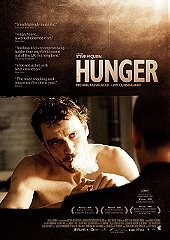Nominally, Hunger is a motion picture about the life of IRA activist Bobby Sands who died in 1981 as the result of a hunger strike. But this startling feature film debut of British visual artist Steve McQueen (no relation to the late actor whose name he oddly shares) doesn't hew to conventional biopic storytelling - instead, it's essentially a relentless and powerful montage of events (mainly the countless protests) that unfolded in Belfast's notorious Maze prison during the 1980s. As a matter of fact, Bobby Sands (played by Michael Fassbender) is not properly introduced until approximately half an hour into the movie. With Hunger, McQueen (who scripted the film with Irish playwright Enda Walsh) has crafted an effective episodic motion picture. The perspective segues smoothly from prisoner to guard to prisoner, and so on, until the film at long last settles on Sands.
From beginning to end, Hunger is a masterwork of detailed atmosphere. Steve McQueen directs with staggering Kubrickian precision; offering a strong, visceral sense of the unspeakably brutal and violent world it portrays with its regular riots, beatings and body searches. The director brings Belfast in 1981 to life with substantial skill, aided by Sean Bobbitt's brilliant cinematography and Tom McCullagh's stunning production design. Hunger truly captures the frigid conditions the naked prisoners endured, while also itemising the nightmarish muck as the prisoners covered the walls with their own faeces to compel British officials into action. McQueen doesn't shy away from any details as he transforms this hell into visual poetry; concentrating on the naturalistic moments the inmates happened upon while wordlessly carrying out their orders and smuggling plans. McQueen insists a viewer not only see but ponder the imagery, and the director allows a viewer to do so by employing contemplative, sometimes agonisingly long, speechless takes.
Indeed, Hunger contains barely any dialogue - it elects to let the stark, unflinching images speak volumes about the madness at hand. The contrast of routine English police manoeuvres with the feral panic of the Irish prisoners is riveting, and coloured enthrallingly by the unspoken moments of reflection as both sides attempt to deal with the daily blasts of violence. Yet, this is not a movie based solely on its imagery - a crucial element of the film is the detailed use of sound. Music is used sparingly, with the omniscient soundscape of the prison's interior instead used to heighten the most poignant moments. And the more Sands withers away towards the film's dénouement, the more minimalist the sound design is rendered (at one point supplying nothing but the sound of wind and Sands' cavernous breathing).
After accomplishing so much using images, McQueen stops to acknowledge the power of words during one of the film's final acts. McQueen's nearly always-in-motion camera and artistic eye is set aside for a riveting 25-minute conversation between two characters. For this sequence, Sands discusses his decision to embark on a hunger strike with Father Moran (Cunningham). The two men debate the merits and ethics of the protest; lending insight into Sands' determination. While the dialogue is insanely spellbinding, it's the execution that's amazing - the bulk of this conversation occurs in one single, 17-minute unbroken take. It's simply a tour de force of writing, acting and moral complexity.
It should come as no surprise that the performances are outstanding. Michael Fassbender (of 300 fame) literally gives his body and soul to the part of Bobby Sands; playing defiance and self-confidence throughout the film's initial two-thirds before wasting away to nothingness (there are a number of haunting, unforgettable images to behold here). Another note-worthy member of the cast is Liam Cunningham, whose acting throughout the aforementioned verbal tango with Fassbender is remarkable. Stuart Graham is also given a memorable role as a prison guard whom the film focuses on at certain points.
Digressions from acclaim must be made, however. The scope of Hunger is admittedly too narrow and its methods are too intensive to offer a comprehensive historical analysis of the troubles of Northern Ireland. Unfortunately, too, the movie doesn't offer any profound insight into its characters. Instead McQueen's movie remains a visual exercise which shows how the characters did what they did, and in what circumstances. The result is a consistently harrowing drama that feels somewhat underdone.
Hunger is a tough viewing experience due to the constant depictions of brutality, but it's more than a portrayal of bodily torment - it's a story of finding humanity amongst the walls of a prison during dark days.
8.3/10
 Login
Login